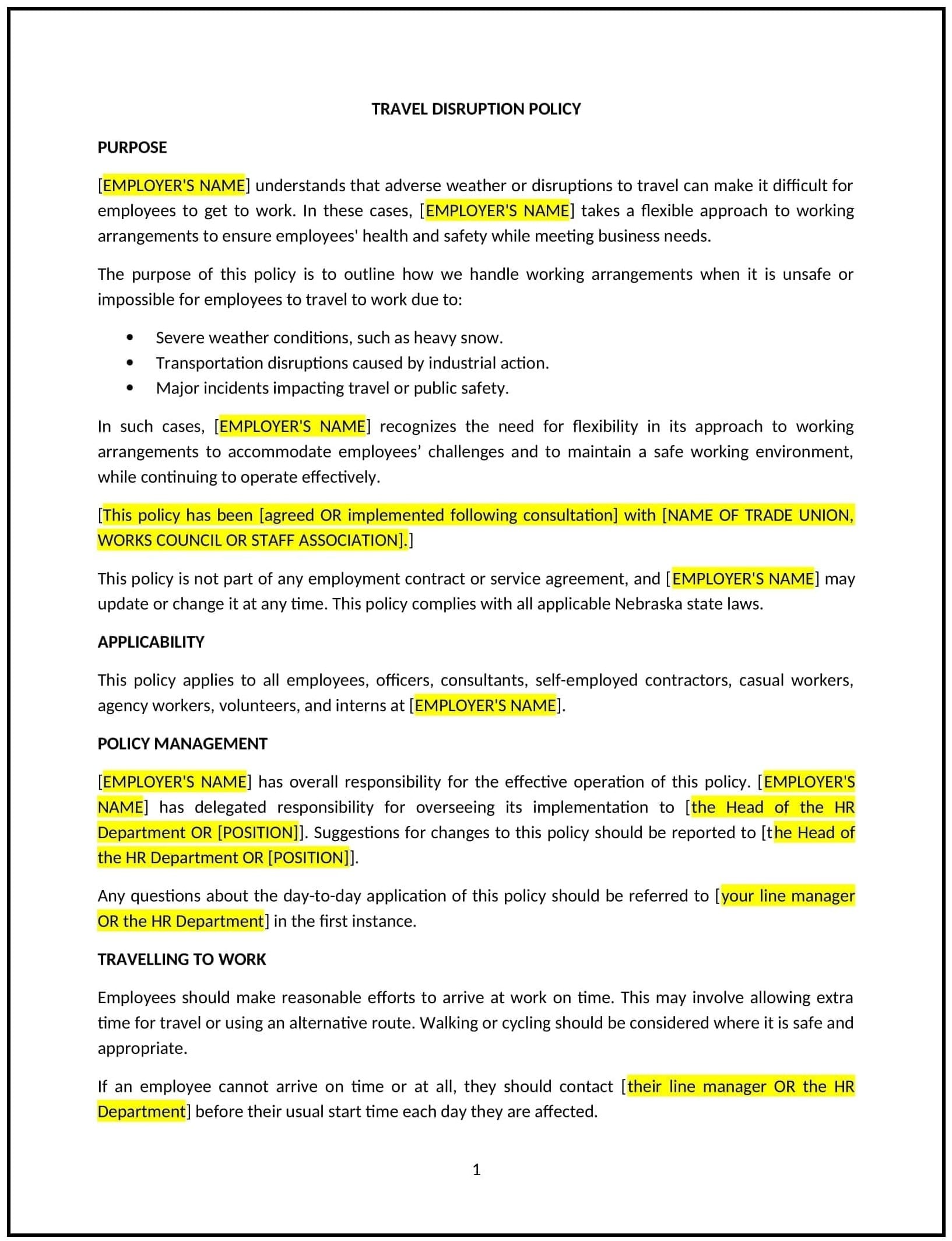Got contracts to review? While you're here for policies, let Cobrief make contract review effortless—start your free review now.

Customize this template for free
Travel disruption policy (Nebraska)
A travel disruption policy helps Nebraska businesses manage and address issues that may arise during employee travel, such as delays, cancellations, or other unexpected disruptions. This policy outlines the steps employees should take when travel disruptions occur, including communication protocols, alternative arrangements, and how the company will assist employees during these situations. It is designed to minimize the impact of travel disruptions on work responsibilities while supporting employees in navigating challenges effectively.
By adopting this policy, businesses in Nebraska can ensure that employees are well-prepared to handle travel disruptions, minimize business interruptions, and maintain productivity when traveling for work.
How to use this travel disruption policy (Nebraska)
- Define travel disruptions: Clearly outline what constitutes a travel disruption, such as flight cancellations, delays, natural disasters, transportation strikes, or other unforeseen events that may affect travel plans. The policy should cover situations that may impact both domestic and international travel.
- Establish communication protocols: Employees should know who to contact in the event of a travel disruption. Specify the appropriate point of contact within the company, such as a travel coordinator, HR, or direct supervisor, and the communication methods (e.g., email, phone) for reporting disruptions.
- Provide guidance on rebooking and alternative arrangements: Employees should be instructed on how to handle rebooking travel or making alternative arrangements. This includes guidance on booking replacement flights, accommodations, or transportation, and whether employees are authorized to make arrangements independently or need approval from the company.
- Clarify impact on work responsibilities: The policy should specify how travel disruptions affect employees' work obligations, including whether additional time off or extended hours will be given if a disruption causes delays in meetings or projects. If necessary, provide flexibility for employees to complete work remotely if travel delays impact their ability to return on time.
- Address expenses during disruptions: Clearly outline how the company will handle additional expenses caused by travel disruptions, such as meal allowances, hotel accommodations, or transportation costs. Specify what the company will reimburse and any limits on reimbursement for emergency expenses.
- Set expectations for documentation: Employees should be required to document travel disruptions, including keeping receipts for any additional expenses incurred and providing a report of the situation. This helps ensure that the company can reimburse employees accurately and maintain transparency in the process.
- Review and update: Periodically review and update the policy to ensure it remains relevant, especially as travel conditions and industry best practices change. The policy should adapt to any changes in travel technology, airline policies, or other external factors that could impact business travel.
Benefits of using this travel disruption policy (Nebraska)
This policy provides several benefits for Nebraska businesses:
- Minimizes business disruptions: By providing employees with clear guidelines on how to handle travel disruptions, businesses can minimize the impact of delays on operations, ensuring that work continues smoothly despite travel challenges.
- Promotes employee support and satisfaction: A well-defined policy shows that the company is prepared to support employees during travel disruptions, helping to reduce stress and increase job satisfaction, especially when issues arise during business trips.
- Improves cost management: By specifying the types of expenses that the company will cover, the policy helps prevent excessive reimbursement requests and ensures that employees are reimbursed appropriately for out-of-pocket costs.
- Enhances communication and efficiency: Clear communication protocols help ensure that employees know whom to contact in the event of a disruption and how to handle the situation efficiently, reducing confusion and delays.
- Fosters a positive company image: A policy that supports employees in navigating travel disruptions can enhance the company’s reputation as an employer that cares for its staff and operates with transparency and fairness.
Tips for using this travel disruption policy (Nebraska)
- Communicate the policy clearly: Ensure that all employees who travel for business are aware of the travel disruption policy, including the procedures for handling delays and cancellations. Include the policy in travel-related documents or employee handbooks.
- Provide training or guidance: Consider offering training or guidelines on how employees should handle travel disruptions, including how to rebook travel and what to do in case of an emergency.
- Encourage proactive planning: Encourage employees to plan ahead for possible disruptions by allowing extra time in their travel schedules, especially for tight connections or international travel.
- Monitor travel disruptions: Stay informed about the common causes of travel disruptions, such as weather or transportation strikes, and proactively communicate any updates to employees when they are traveling.
- Review expense reimbursement processes: Ensure that employees know how to submit receipts for additional expenses and keep the process for reimbursement efficient and straightforward.
- Update the policy regularly: Review the travel disruption policy periodically to ensure it stays up to date with changes in the travel industry, business operations, or employee feedback.